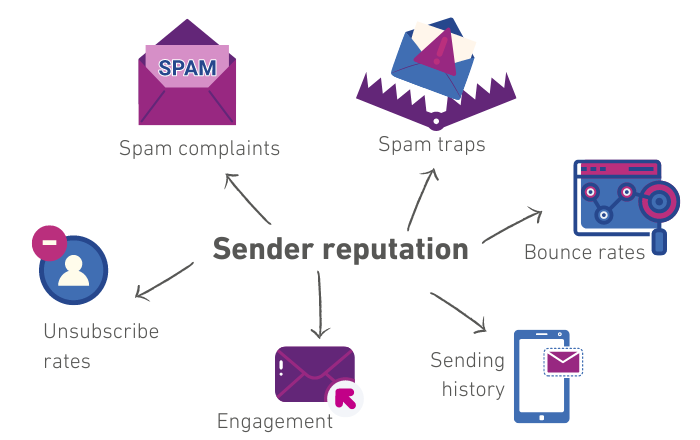Due to how important a valid email is to businesses these days, it means there’s a lot of senders competing for a spot in a consumer’s inbox. And it’s only growing. If you’re a company using email – which is probable – you need to consider what your sender reputation is and how to protect it.

What is email sender reputation?
Email sender reputation is a score on how trustworthy an email sender is based on a number of factors such as sending habits, content quality, recipient engagement and spam complaints.
Your email sender reputation score is important to ensuring high email deliverability rates, based on how much the email providers trust your domain, IP address, send frequency and more. Put simply if you have a poor score then your emails won’t be getting to the recipient.
If you are in good standing, you are more likely to have quality email addresses that are reaching the intended recipient’s inbox at an appropriate rate.
If you are in bad standing, or have a poor sender reputation, you’re less likely to have high email deliverability; the address is incorrect, it’s a spam trap, it’s landing in spam folders, and you are sending at mass rates. In this case, you could be blacklisted by various email platforms, which means your emails are treated as spam, your message will end up in a spam folder or not delivered at all (blocked entirely).
In an environment where 99% of businesses are sending emails as a primary way to communicate with customers and you are competing against 9.8 billion other email sends, you don’t want to assume you have good sender reputation.
Bad data means a bad reputation
Email bounce rate is a good indicator of what your data quality is like, which is key to upholding high email deliverability for sender reputation. A reasonable email bounce rate is 2%. Do you know what your bounce rate is? If your rates are trending higher than this benchmark, you likely have a lack of quality control in your email database.
There can be a few reasons why an email is not reaching the intended mailbox, and it all has to do with data quality:
-
Inbox is inactive or non-existent.
Consider all those email accounts that are created for a one-time purpose, then never looked at again. There’s a chance the customer used that address to sign up with you so that’s how you think you are reaching them—but you’re not.
-
Email is not formatted correctly.
Emails have a specific format, and they must include the username, at symbol (@), domain, and top-level domain (.com). There are several reasons why email addresses may not be formatted correctly, such as a simple typo, but it’s an error that will result in a bounced-back message.
-
There are spelling errors
Experian research finds that 50% of data issues are due to human error. This is such an easy mistake for the user entering information which is why quality control becomes essential to minimising the bounce rate and keeping a good sender reputation.
Sending confirmation emails, notifications, customer service messages, marketing campaigns to a poor-quality email repeatedly will not only result in wasted time and cost but will give you a poor sender reputation score and leave you blacklisted.
Keep email hygiene a top priority
 Clean and correct email addresses will increase deliverability, decrease bounce rates, and ensure a good-standing reputation. In other words, you are confidently reaching the intended recipient’s inbox with the right message.
Clean and correct email addresses will increase deliverability, decrease bounce rates, and ensure a good-standing reputation. In other words, you are confidently reaching the intended recipient’s inbox with the right message.
How do you clean emails? This is where email validation solutions play an important role. Email cleansing will verify email addresses by checking for activity and correcting format and spelling. A tool like this will also remove spam recipients or spam complainers—individuals who mark your email as spam (red flag!). Email validation can also provide suggestions to correct emails, if an email has been entered incorrectly.
Another component to correcting email addresses is having insight to the most-used inbox (email address) by the consumer. A Statista study found that 28% of respondents have over four email addresses. You want to be sure that you are reaching the inbox that has the highest activity. This is where email append solutions—a service that takes a name and postal address and matches the valid email—can level up your email strategy, increasing return on investment for marketing and supporting sender reputation.
Why now?
Google is cleaning up their Gmail accounts. Which means they are reviewing 1.8 billion active accounts and removing any personal addresses that have been inactive for over two years. They’re doing this because unused, older accounts are more susceptible to security threats.
The result could mean a pile up of non-existent email addresses in your database, if you aren’t staying on top of your email hygiene. Before you know it, your sender reputation score could plummet leaving you without a primary communication channel and this affects all the emails you are sending, not just the gmail addresses.
The takeaway: Keep your sender reputation high by cleaning your emails
Email is the top channel used by businesses to reach consumers. The competition is high and the risk of bad data impacting your deliverability and sender reputation is even higher.
